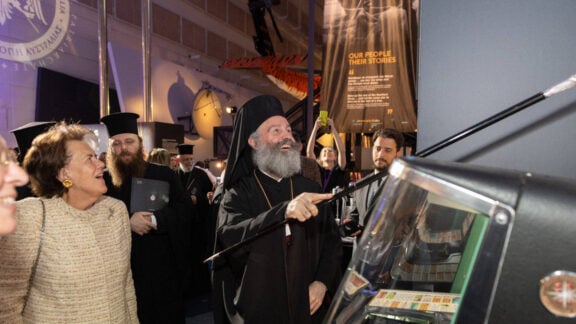In a landmark review since multiculturalism became policy some 50 years ago, the Australian government released a report today examining the state of multiculturalism across the nation.
The Multicultural Framework Review assesses the health Australia’s multicultural society, and makes 29 recommendations to strengthen it for the future.
In preparing the report, the panel of three eminent Australians, Dr Bulent Hass Dellal AO, Nyadol Nyuon OAM and Christine Castley, travelled the country and consulted with more 1430 individuals and 750 organisations, including community groups, in more than 200 consultation events.
Among the groups they consulted with were the Greek Community of Melbourne & Victoria, Greek Orthodox Archdiocese of Australia – Melbourne District, Greek Community (TAS) and Ethnic Communities Council of various states.
They also consulted with Independent Multicultural Media Australia (IMMA), who Neos Kosmos are a founding member.
Multiculturalism is widely observed as one of the great successes of modern Australia, but the review has suggested that there is still much work remaining to ensure all communities feel safe and can be proud of who they are, regardless of their religious, ethnic or cultural background.
“The Review writes a new chapter in our multicultural story, and will inform how we can work together to achieve a vibrant, prosperous multicultural future,” multicultural affairs minister Andrew Giles said at today’s media launch.
“Our shared values of respect, unity, and compassion will underpin our multicultural nation, and the report reflects how these principles can guide us towards peace and understanding.
“Our diversity is our greatest strength, and this review showcases an Australia that we can build together as one united nation.”
The Albanese Government has also committed more than $100 million to support a stronger multicultural Australia.

Funding will enable investment in language services, support for increased community engagement and allow multicultural organisations to improve amenities, and strengthen their ability to serve both members of their own community and the broader society.
Some of the 29 recommendations to government include improving multicultural grants and funding programs, ensuring the sustainability and quality of language services and improving access to government funding for independent multicultural media.
When asked by Neos Kosmos to elaborate on multicultural media at the press conference, Dr Dellal said they realised how underutilised it was.
“We saw evidence on the incredible work they did during the pandemic and reaching to communities in language and being able to work with government services in providing the appropriate services to the appropriate communities,” he said.
“Our diversity is complex and our diversity has many dynamic features to it in terms of community representation and where the communities are.
“I think the independent media play a very important role and I think it’s important that there are relationships established between the government and independent media.”
IMMA welcomed the review, with secretary Fotis Kapetopoulos saying it continues the pioneering work set 50 years ago and has recognised the essential role independent multicultural media plays in public interest journalism.
“IMMA agreed with the minister when he said the review ‘writes a new chapter in our multicultural story’, and we agree that we can work together to achieve a prosperous multicultural future,” Kapetopoulos said.
In response to another media outlets who asked about sustaining language, Giles said they recognise its importance.
“Certainly the importance that we’ve recognised for some time in terms of having a world leading program that teaches English to migrants, but also to recognise the extraordinary variety that we have in the languages that are spoken around our country today,” he said.
“We are supporting more than 600 community language schools around the country, in recognition of both the importance of language inherently but also the political enabler of maintaining connection to the culture.”
Dellal added that there are economic benefits that this country can derive from ensuring that we encourage learning a second or third language.
In a statement sent to Neos Kosmos, the Federation of Ethnic Communities’ Council of Australia (FECCA) welcomed the review.
“The Multicultural Framework Review represents a once in a lifetime opportunity to embrace who we are as a nation and put into place the foundation for a truly inclusive and prosperous multicultural society to carry us into the 21st century,” said Chair of FECCA Carlo Carli.
“We are ready to work with local, state and federal agencies to support the establishment of the Multicultural Affairs Commission, as well as a dedicated Department of Multicultural Affairs, Immigration and Citizenship.”
Fronditha Care have also welcomed the review and were particularly pleased to see that their submission and recommendations were considered.
In Australia, the proportion of older people from culturally diverse backgrounds is increasing at a faster rate than other older people.
“In our submission we advocated for a robust and dynamic approach to ensure all older Australians can access culturally appropriate and inclusive aged care, whatever their background,” said Fronditha Care CEO Faye Spiteri OAM in a statement.
“We particularly welcome Recommendation 24 which proposes the establishment of a dedicated Multicultural Aged Care Unit within the Department of Health and Aged Care to engage and collaborate with multicultural communities to develop a robust, dynamic approach to culturally sensitive aged care.”
You can read more about the Multicultural Framework Review here.









